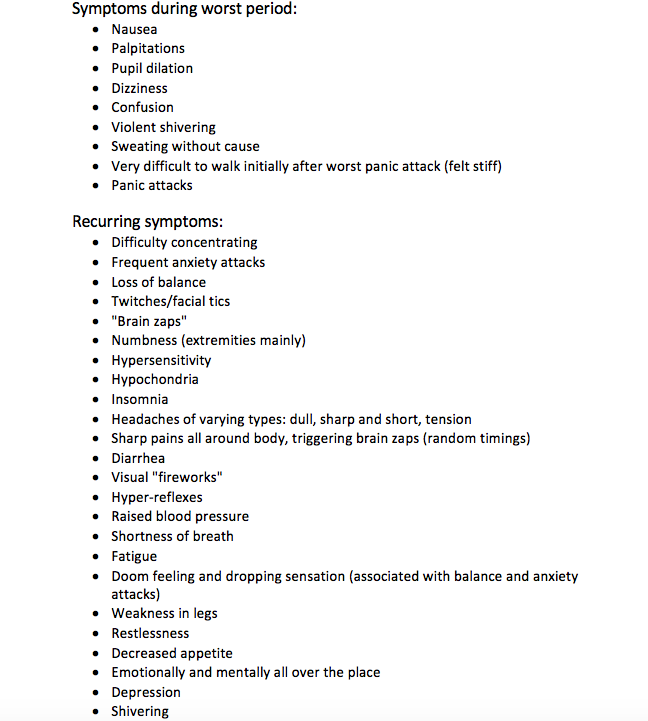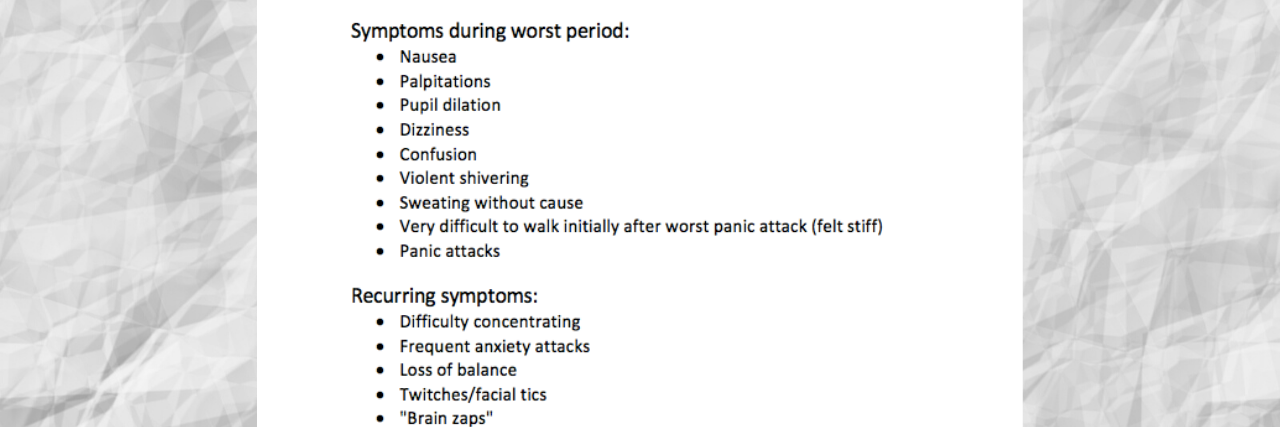What I Learned After Looking at a List of My Mental Health Symptoms
Editor's Note
Any medical information included is based on a personal experience. For questions or concerns regarding health, please consult a doctor or medical professional.
In the bottom drawer of my bedroom cupboard lies a folder. Within it are papers documenting my journey through my illness. I made them at the insistence of my wonderful mum. She knew I was in no state to explain what was going on to the doctors. My world was filled with doubt. So much so, it was like I couldn’t trust the very ground I stood on, for fear it would give way…

The image above shows one of the first I made. It is a list of the symptoms that unceremoniously arrived after I took four antidepressant tablets*. I think depression is the only recurring symptom on the list I had experienced before I took the tablets. The symptoms during the worst period lasted for a few days to a few weeks — the recurring ones around eight months. The panic/anxiety attacks were the worst symptoms. The funny thing is that I had no idea what the difference was between a panic attack and an anxiety attack when I wrote this list. That was until curiosity got the better of me, and I watched some YouTube videos of some brave individuals filming themselves having panic attacks. Which looked just like what I called my anxiety attacks. The problem was that my first experience of a panic attack was intense — i.e. I was on the floor in the fetal position, uncontrollably shaking, eyes shut, with what felt like liquid lava seeping through my brain.
In truth, while of course terrifying, it is also one of the oddest and most profound experiences I have ever had. My entire conscious life I had been in control. If I wanted to raise my right arm, it would comply. I don’t think many people, through most of their lives, get to have any other perspective. But once I did, I realized it is quite a fantastic thing. I can make my body do all sorts of ridiculous things it really doesn’t want to do. Like cricket. If my body had a voice, I am sure it would not shut up about how stupid and clearly unnatural it is to contort this gravity-defying set of limbs into a bowling action. But that is the majesty of the mind. Most of us have the ability to explore whatever we like and, more importantly, to choose whether we heed the warning signs our body and mind give us. This experience taught me that the feeling of control is a precious and valuable thing, and ultimately, fallible.
In my own head, the way to discern between an anxiety attack and a panic attack is, if you can speak during the attack, it isn’t a panic attack. However, to have only two terms describing the entirety of the extremely wide and complex spectrum of panic/anxiety attack intensity, is a grossly underused application of the English language. It is of course, relative to the individual too. Even the most minor of anxiety attacks will feel overwhelming to any who has never experienced them before.
Having been by my side for the entirety of my illness, my mum has no idea how I didn’t end up in hospital. I’m not sure I could give you a clear answer either. That bottom list of symptoms never let up, the pesky devils. Most of them were with me, every day, every night, for the longest eight months of my life.
Over time, and with some perspective, I realized there was a small, fortunate side of my situation. Yes, I had lost control and could no longer trust my body, but now I knew what that felt like. No one expected anything of me anymore. I was, at this point in time, a visibly broken human being, incapable of the simplest of tasks. For a short period, I lived with no expectation whatsoever, resulting in a feeling of freedom which now escapes me. It came with a terrible, terrible cost of course. Which is how I realized everything in life comes with a cost! Striving to feel constantly happy is not a realistic goal. It is in fact a venture doomed to failure.
Very slowly, I realized there is no fundamental pressure to achieve anything, no shame in feeling the lowest of the low, or any kind of feeling. I learned how tremendous the illusion of control really is. I figured out there are lessons to be learned in all experiences: positive and negative, through happiness and sadness, bravery and fear. And learning them gives a satisfaction and contentment to living that nothing else, so far, has surpassed.
It was indeed this last point, which allowed all the items from my little list of hell to be erased.
*It would be easy to be a naysayer of antidepressants, and join the legion of those wishing they never existed. And while I am quite certain they were the trigger for these symptoms, I don’t think they caused them. It was years upon years of foolishness, of ignoring and “pushing through” all the warning signs my body and mind were giving me. I put myself in an extremely precarious psychological position. Years before I had really bad depression — lasting for weeks on end. Had I taken antidepressants, had I gone into proper counseling, practiced meditation and wellbeing, actually looked after my body and mind then, I am quite certain none of this would have happened. More so, I believe the antidepressants would have had their intended effect.
I remember explaining to my therapist years ago how my stress was like bees buzzing in a cage in the back of my mind, ever increasing, pushing on the cage door. Antidepressants (which I do take now) to me are like that spray which calms the bees down. They don’t remove the bees, they don’t stop more bees from being produced, but they help to ease the pressure on the door of the cage in the back of each of our minds. For whatever reason, one I will likely never know, the antidepressants I took accidentally helped to open my cage door. Even so, I want to reiterate that antidepressants are very safe. With the enormous amount of stress I was putting on myself the cage door was going to open eventually. Maybe not as quickly or with as much devastation, but I’m quite sure it was going to open at some point.

